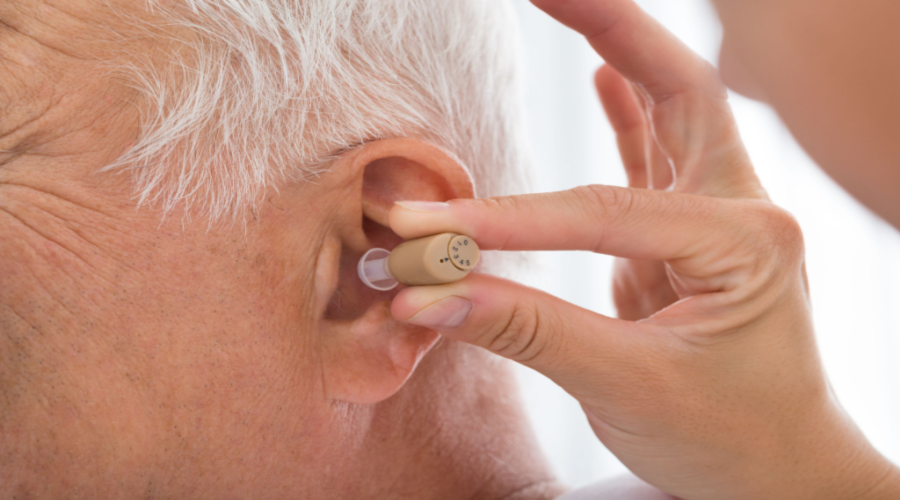If you haven’t already heard, put on your listening ears: A final rule was issued by the Food and Drug Administration (FDA) that will grant millions of Americans access to over-the-counter (OTC) hearing aids. Companies may begin selling these OTC devices as early as mid-October.
“This will allow consumers to purchase hearing aids at retail and pharmacies without a prescription from a hearing care professional,” said Anthony Florek, president and cofounder of Soundwave Hearing.
This is great news, as OTC hearing aids have the potential to make hearing aids more easily available to those who may not otherwise be able to afford them, and without the requirement of a prescription. It also brings in additional revenue for pharmacies, provides easy, accurate testing, and offers instant results.
The intention of OTC hearing aids is to help adults with mild to moderate hearing loss, according to the FDA Reauthorization Act of 2017. But consumers should keep in mind that hearing loss can sometimes be a symptom of an underlying health issue, such as cardiovascular disease, diabetes, or chronic kidney disease.
“Consumers should have their hearing tested just like their eyesight. They should make an appointment with a hearing professional to make sure they don’t overlook a serious medical condition that might be causing their hearing loss,” Florek said.
OTC hearing aids make it easy for consumers to find the one that works best for them, allowing them to control the settings without the help of a hearing-healthcare professional. Depending on the brand, consumers will have controls that provide a hearing test and adjustments to volume using a smartphone app.
Pharmacists and audiologists will need to collaborate and foster a working relationship in their communities. Since OTC hearing aids will only be available for people with mild-to-moderate hearing loss and sold to those who are 18 years and older, consumers’ eligibility will need to be established. For those who don’t qualify for OTC hearing aids, pharmacists should have a plan for referring them to an audiologist. If you haven’t yet established a relationship with an audiologist, check out the website called Find an Audiologist by the American Academy of Audiology that can help start that connection.
It’s also important that you learn how to communicate with people who have hearing loss. You’ll need good communication skills so that you know you’re being heard and understood by your patients. For example, making your face visible, reducing background noise, and in some cases, using a portable amplifier.
Once OTC hearing aids hit the stores, you’ll be able to help your patients choose and select the right one for them with the Hear Me Now program, which allows pharmacies to stock hearing aids over the counter once the FDA regulations are finalized.
Call the PBA Health customer support team to learn more about the Hear Me Now program (816-245-5700). Or send an email to customersupport@pbahealth.com.
How to Recognize a Good Candidate for OTCs
Having OTC hearing aids available for sale in your community pharmacy will give you the opportunity to educate and counsel patients seeking hearing health care. This will be helpful in determining whether they’re suitable candidates for an OTC hearing aid or if they need to be referred to an audiologist. Listed below are some tips from the Hearing Health Foundation to help you recognize patients who may benefit from OTCs and those who may not.
Signs that a Patient May Be a Good Candidate for OTC
- Their hearing loss falls within the mild-to-moderate range
- The patient has accurate and consistent perception of his or hearing ability
Signs that a Patient May Not Be a Good OTC Candidate
- They show signs of cognitive impairment
- They have inappropriate expectations about the benefit of a hearing aid
- They show signs of poor agility
If a patient shows signs of dizziness, sudden hearing loss, pain or discomfort, discharge, or excessive earwax, a medical referral should be made. By consulting with a medical professional, your patient will be able to rule out an infectious disease or other trauma and receive medical treatment if needed.
Refer to an Audiologist if the Patient Reports:
- They’re younger than 18 years of age
- Asymmetrical hearing
- A sudden onset of hearing loss in one or both ears
- Ringing, roaring, or beeping in one or both ears
- A history of exposure to ototoxic medications
- A history of chemotherapy or radiation to the neck and head region
- Greater than a perceived mild-to-moderate loss of hearing
Source: ASHA (American Speech-Language-Hearing Association) www.asha.org
From the Magazine
This article was published in our quarterly print magazine, which covers relevant topics in greater depth featuring leading experts in the industry. Subscribe to receive the quarterly print issue in your mailbox. All registered independent pharmacies in the U.S. are eligible to receive a free subscription.
More articles from the September 2022 issue:
- Expand your Revenue Streams
- New COVID-19 Subvariant Threatening the U.S.
- Coming Soon: Over-the-Counter Hearing Aids
- Planograms Lend a Helping Hand
- Reducing Patients’ Fall Risk
- ProfitGuard Helps You Hold the Line
- Mastering Inventory Management
- Addressing Social Determinants to Health
A Member-Owned Company Serving Independent Pharmacies
PBA Health is dedicated to helping independent pharmacies reach their full potential on the buy-side of their business. Founded and run by pharmacists, PBA Health serves independent pharmacies with group purchasing services, wholesaler contract negotiations, proprietary purchasing tools, and more.
An HDA member, PBA Health operates its own NABP-accredited warehouse with more than 6,000 SKUs, including brands, generics, narcotics CII-CV, cold-storage products, and over-the-counter (OTC) products — offering the lowest prices in the secondary market.












